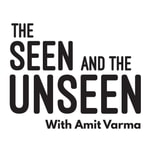DAKSH Podcast – Détails, épisodes et analyse
Détails du podcast
Informations techniques et générales issues du flux RSS du podcast.

DAKSH Podcast
Maed in India
Fréquence : 1 épisode/26j. Total Éps: 35

Classements récents
Dernières positions dans les classements Apple Podcasts et Spotify.
Apple Podcasts
🇫🇷 France - government
21/05/2025#86🇫🇷 France - government
20/05/2025#76🇫🇷 France - government
19/05/2025#69🇫🇷 France - government
18/05/2025#65🇫🇷 France - government
17/05/2025#61🇫🇷 France - government
16/05/2025#55🇫🇷 France - government
15/05/2025#47🇫🇷 France - government
14/05/2025#31🇫🇷 France - government
29/04/2025#95🇫🇷 France - government
28/04/2025#92
Spotify
Aucun classement récent disponible
Liens partagés entre épisodes et podcasts
Liens présents dans les descriptions d'épisodes et autres podcasts les utilisant également.
See all- https://www.maedinindia.in/
156 partages
- https://www.dakshindia.org/donate/
38 partages
- https://adrindia.org/
4 partages
- https://twitter.com/shaunfanthome
21 partages
- https://twitter.com/february_31st
12 partages
- https://twitter.com/SeanDmello
11 partages
Qualité et score du flux RSS
Évaluation technique de la qualité et de la structure du flux RSS.
See allScore global : 58%
Historique des publications
Répartition mensuelle des publications d'épisodes au fil des années.
The India Justice Report
Épisode 34
lundi 8 juillet 2024 • Durée 13:10
In this episode, Valay Singh of the India Justice Report (IJR) delves into the critical state of justice capacity in India, highlighting key findings from the India Justice Reports from 2019 and 2022. Access to justice, a fundamental right guaranteed by the Constitution of India, is as essential as health, education, and water for the country's social and economic development. The IJR reveals significant challenges within the Indian justice system, from an overwhelming backlog of pending cases to overcrowding in Indian prisons, where the majority of inmates are undertrials, and the systemic issues across legal, police, judiciary and prisons that hinder effective justice delivery.
References:
- Approaches to Justice in India https://www.dakshindia.org/approaches-to-justice-in-india/
- Bureau of Police Research and Development (BPR&D) https://bprd.nic.in/
- India Justice Report https://indiajusticereport.org/
- National Judicial Data Grid (District and Taluka Courts of India) https://njdg.ecourts.gov.in/njdgnew/index.php
CREDITS:
Host: Valay Singh
This is a Maed in India production.
Producer: Sean D’mello
Sound Design & Mixing: Lakshman Parsuram
Project Supervisor: Shaun Fanthome
Police Violence in Films
Épisode 33
lundi 1 juillet 2024 • Durée 33:42
In this episode, we explore the depiction of custodial violence in films with Deepanjana Pal. Deepanjana Pal is a journalist and author. She writes about culture and society. Her film writing has appeared in a range of publications and she was most recently the managing editor of the website Film Companion.
Films about cops in India often sensationalise and normalise police brutality, possibly desensitising audiences to the suffering of real people. In this episode, we critically examined how these films reflect societal attitudes toward power, authority, and justice. We also discussed whether they contribute to meaningful discourse or merely exploit trauma for entertainment.
References:
- K Chandru, What The Sathankulam Custodial Murders Reveal
https://article-14.com/post/what-the-sathankulam-custodial-murders-reveal
- Kalpana Nair, Five Films that Don’t Glamorise Police Violence https://www.filmcompanion.in/fc-lists/jayaraj-bennix-5-films-that-dont-glamorise-police-violence-visaranai-vetrimaran-sooryavanshi-singham
- Omkar Khandekar, Rethinking the angry young cop in Indian cinema https://lifestyle.livemint.com/how-to-lounge/movies-tv/rethinking-the-angry-young-cop-in-indian-cinema-111634476144273.html
- Karthik Kumar, Sathankulam custodial deaths: Singam director Hari regrets making films glorifying police https://www.hindustantimes.com/regional-movies/sathankulam-custodial-deaths-singam-director-hari-regrets-making-films-glorifying-police/story-2NxchO4mslUFz2s68NkW4H.html
- Rohit Shetty reacts to claims of glorifying police brutality with his films: ‘Darr hona zaruri hai, okay to get trolled'
CREDITS:
Host: Leah Verghese
This is a Maed in India production.
Producer: Sean D’mello
Sound Design & Mixing: Lakshman Parsuram
Project Supervisor: Shaun Fanthome
Election Commission
Épisode 24
lundi 22 avril 2024 • Durée 13:11
In this episode, the first in our series on elections, Leah Verghese discusses the Election Commission, the institution that oversees the mammoth task of elections in the world’s largest democracy. Learn more about this significant public institution, its origin, evolution, and the important personalities who shaped its trajectory.If you like our podcast, do consider supporting us with a donation at the link below: https://www.dakshindia.org/donate/
References
- About Election Commission of India https://www.eci.gov.in/about-eci
- An Expert Explains: How EC evolved, what rules it follows in case of disagreement https://indianexpress.com/article/explained/an-expert-explains-how-election-commission-evolved-what-rules-it-follows-in-case-of-disagreement-5720029/
- Anoop Baranwal vs. Union of India WP (CIVIL) NO.104 OF 2015
- Appointment of CEC, EC | Supreme Court refuses to stay new law; issues notice for hearing in April https://www.thehindu.com/news/national/appointment-of-cec-ec-supreme-court-refuses-to-stay-new-law-issues-notice-for-hearing-in-april/article67733389.ece
- Manjari Katju, Election Commission and Changing Contours of Politics Economic and Political Weekly Vol. 44, No. 16 (Apr. 18 - 24, 2009)
- Manjari Katju, Election Commission and Functioning of Democracy Economic and Political Weekly , Apr. 29 - May 5, 2006, Vol. 41, No. 17 (Apr. 29 - May 5, 2006)
- R. P. Bhalla, Electoral Mechanism in India (1951-1971) The Indian Journal of Political Science Vol. 33, No. 1 (JAN-MAR, 1972)
- S.S. Dhanoa vs. Union of India (1991) 3 SCC 567
- The Chief Election Commissioner and Other Election Commissioners (Appointment, Conditions of Service and Term Of Office) Act, 2023
CREDITS:Host: Leah Verghese
This is a Maed in India production.
Producer: Sean D’mello
Sound Mixing: Lakshman Parsuram
Project Supervisor: Shaun Fanthome
Research Assistance: Manushree Sarkar
The End of the Electoral Bond Era
Épisode 23
mercredi 28 février 2024 • Durée 48:09
This episode is a collaboration with Grand Tamasha, an excellent podcast on the latest developments in Indian politics, economics, foreign policy, society, and culture. Milan Vaishnav, the host of Grand Tamasha, joins us for this bonus episode. On 15 February 2024, the Supreme Court, in a unanimous landmark verdict, struck down the controversial electoral bonds scheme. Given that general elections are just around the corner, Milan discussed how this judgment will impact the financing of political parties in the largest democracy in the world. If you like our podcast, do consider supporting us with a donation at the link below: https://www.dakshindia.org/donate/
- The DAKSH Podcast https://www.dakshindia.org/the-daksh-podcast/
- Ajoy Sinha Karpuram, Why did the Supreme Court strike down the Electoral Bonds Scheme? https://indianexpress.com/article/explained/explained-law/supreme-court-electoral-bonds-verdict-9163729/
- Arun Jaitley, Why Electoral Bonds are Necessary https://pib.gov.in/newsite/PrintRelease.aspx?relid=175452
- Association for Democratic Reforms & Anr. Writ Petition (C) No. 880 of 2017 https://main.sci.gov.in/supremecourt/2017/27935/27935_2017_1_1501_50573_Judgement_15-Feb-2024.pdf
- Part 1: Behind the BJP’s rise and rise, bonds, trusts and raids on corporates https://www.newslaundry.com/2024/02/20/behind-the-bjps-rise-and-rise-bonds-trusts-and-raids-on-corporates
- DAKSH Podcast, Crime and Politics (Milan Vaishnav) https:www.dakshindia.org/crime-and-politics/
- Milan Vaishnav, On electoral bonds, a short-lived celebration https://www.hindustantimes.com/opinion/on-electoral-bonds-a-short-lived-celebration-101708170676086.html
- Press Release: Introduction of the Scheme of Electoral Bond https://www.dea.gov.in/sites/default/files/Electoral%20Bonds_Press%20RELEASE_2-1-2018.pdf
Algorithms in the judiciary
Épisode 22
lundi 21 novembre 2022 • Durée 07:13
Technological interventions have the ability to enhance access and improve the efficiency of the various processes in the justice system. In this episode, we will discuss how technology can improve the justice system and how we should monitor that improvement.
If you like our podcast do consider supporting us with a donation at the link below: https://www.dakshindia.org/donate/
CREDITS:
Host: Sandhya PR
This is a Maed in India production.
Producer: Nikkethana K
Sound Mixing: Lakshman Parsuram
Project Supervisor: Shaun Fanthome
Open Courts
Épisode 21
lundi 14 novembre 2022 • Durée 13:02
Our legal system is based on the fundamental principle of open courts. Courts must be “open”, physically and metaphorically, to the public. We, as citizens, should know and understand what courts do for us. In this episode we explore what this principle means and ponder on how it can be used to promote transparency in the court system, right from entering courtrooms as ordinary citizens to considering the live-streaming of court proceedings.
If you like our podcast do consider supporting us with a donation at the link below: https://www.dakshindia.org/donate/
Host: Anindita Pattanayak
This is a Maed in India production.
Producer: Nikkethana K
Sound Mixing: Lakshman Parsuram
Project Supervisor: Shaun Fanthome
India’s first sedition trial and age of consent
Épisode 20
lundi 7 novembre 2022 • Durée 15:16
The role of the state in reforming religious and social practices is a subject of heated debate in India. This is especially so when such reforms involve claims of women. A recent example is the debate around marital rape. In this episode we go back more than 130 years and examine the reactions to the British government increasing the age of consent for women from 10 to 12 years and how these led to India’s first sedition trial.
Research Assistance: Jiyon Chatterjee
If you like our podcast do consider supporting us with a donation at the link below: https://www.dakshindia.org/donate/
Reading list
- Chitranshul Sinha, The Great Repression India, Viking 2019
- IshitaPande, "Phulmoni's body: the autopsy, the inquest and the humanitarian narrative on child rape in India." South Asian History and Culture 4.1 (2013): 9-30.
- Queen-Empress vs Hurree Mohun Mythee (1891) ILR 18 Cal 49 https://indiankanoon.org/doc/1410526/
Host: Leah Verghese
This is a Maed in India production.
Producer: Nikkethana K
Sound Mixing: Lakshman Parsuram
Project Supervisor: Shaun Fanthome
Constitutionality of laws - An explainer
Épisode 19
lundi 31 octobre 2022 • Durée 11:30
As many antiquated laws like Section 377, adultery and sedition are being questioned, do you ever wonder what challenging the constitutionality of a law really means? Have you been confused about what striking down and reading down laws are? In this episode, we break down the meaning of “unconstitutionality” and do a quick explainer of what it means to declare a law unconstitutional.
If you like our podcast do consider supporting us with a donation at the link below: https://www.dakshindia.org/donate/
Reading list:
CREDITS:
Host: Anindita Pattanayak
This is a Maed in India production.
Producer: Nikkethana K
Sound Mixing: Lakshman Parsuram
Project Supervisor: Shaun Fanthome
UK's Experience In Court Administration with Nick Goodwin
Épisode 18
lundi 10 octobre 2022 • Durée 21:41
In this episode of the DAKSH podcast, we spoke to Nick Goodwin, CEO of His Majesty’s Courts and Tribunal Service (HMCTS), UK. HMCTS is a unique institution, a partnership between the judiciary and the parliament. It is responsible for the administration of criminal, civil and family courts and tribunals in England and Wales.
It assists the judiciary in its administrative and management functions. Nick Goodwin has joined us today to talk about the roles and responsibilities of the HMCTS, and its plans.
This episode was recorded on 5 September 2022
If you like our podcast do consider supporting us with a donation at the link below: https://www.dakshindia.org/donate/
Reading list:
- The HMCTS reform programme: https://www.gov.uk/guidance/the-hmcts-reform-programme
- HM Courts & Tribunals Service Framework Document https://assets.publishing.service.gov.uk/government/uploads/system/uploads/attachment_data/file/384922/hmcts-framework-document-2014.pdf
- Harish Narasappa and Leah Verghese, Mountain of pendency, The Week 8 February 2020 https://www.theweek.in/theweek/cover/2020/02/07/mountain-of-pendency.html
- Joe Tomlinson, How digital administrative justice is made https://bristoluniversitypressdigital.com/view/book/9781447340331/ch004.xml
CREDITS:
Host: Surya Prakash B. S.
This is a Maed in India production.
Producer: Nikkethana K
Sound Mixing: Lakshman Parsuram
Project Supervisor: Shaun Fanthome
Search and Seizure with Abhinav Sekhri
Épisode 17
lundi 3 octobre 2022 • Durée 34:50
In this episode we explore the police powers of search and seizure with Abhinav Sekhri, a criminal lawyer and the author of the wonderful blog Proof of Guilt. During their investigation, law enforcement authorities like the police and customs and tax officials have the power to search our person and property, ranging from homes and godowns to laptops and other electronic devices. They can also seize objects they believe to be incriminating or relevant to their investigation. The exercise of these powers can create very distressing situations for people, especially if they are unaware of their rights. Abhinav helps us understand what the extent of these police powers are and emerging legal developments that may lead to reform.
If you like our podcast do consider supporting us with a donation at the link below: https://www.dakshindia.org/donate/
CREDITS:
Host: Anindita Pattanayak
This is a Maed in India production.
Producer: Nikkethana K
Sound Mixing: Lakshman Parsuram
Project Supervisor: Shaun Fanthome








